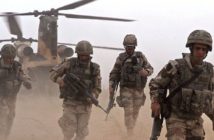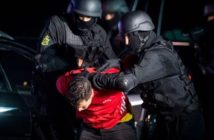Eurasia Review

Islamist fighters in northern Mali
By IRIN
IRIN is the humanitarian news and analysis service of the UN Office for the Coordination of Humanitarian Affairs.
Author’s Website http://www.irinnews.org/
As humanitarian agencies grapple with a deepening displacement and food security crisis in Mali, analysts point to the need for deep-seated reforms in the government and army if longer-term stability and development is to be attained.
Since the beginning of the conflict in early 2012, an estimated 431,000 (260,665 IDPs and 170,313 refugees) have been displaced and 4.3 million people are in need of humanitarian assistance, according to the UN Office for the Coordination of Humanitarian Affairs (OCHA).
The conflict has exacerbated food insecurity in northern Mali and placed huge strain on host communities’ scarce resources in central and southern regions. Ethnic tensions remain high and there are disturbing reports of retaliatory violence and killings, it says.
According to a recent UN assessment of priority needs, “the dynamics of Mali’s crisis have changed dramatically in the security, political and humanitarian fronts [since January 2013.] To a certain extent, the context has become more complex and less readable and predictable than before. Uncertainties remain on the political front and one cannot exclude the emergence of new tensions.”
The humanitarian situation is intertwined with a political crisis the root causes of which, according to Gilles Yabi, the International Crisis Group (ICG) think tank director for West Africa, “Malian elites do not seem ready to confront collectively. They should be able to agree on a minimum [criteria to restore governance] and right now the conditions for such a debate are not met.”
Many Malians complain about a lack of development, despite considerable Western aid. Widespread perceptions of high-level corruption contributed to the enthusiasm with which Capt Amadou Sanogo was welcomed immediately after his 22 March 2012 coup.
“The real question is: Are Malians going to rebuild their governance system or will they narrow their aim to reviving the old system? To be honest, we don’t really feel that there is a spirit for change,” said a European diplomat who preferred anonymity.
“The truth is that interim president Dioncounda Traoré does not hold all the power. Capt Sanogo and his men are still the law in Bamako. There are still two captains in the Mali ship,” said a US diplomat also on condition of anonymity.
Meanwhile, some believe a peaceful transition is possible, at least in the short term: “There are still serious political and security challenges, but the transition period should hold until the election, if not in July, at least within a reasonable time frame,” said Yabi.
However, Sanogo and other loyal hardliners may be loath to completely and permanently relinquish politics, argued a French diplomat who spoke to IRIN on condition of anonymity. “There is the risk posed by the radicals in Sanogo’s entourage, though he seems to be controlling them. Then there is the risk that he will try to stay forever in the political arena – for example by endorsing a presidential candidate.”
Elections
Mali’s current government is unelected and was established following pressure by regional organizations and Western governments after the coup. Its authority is limited and its backers are keen on a government with broader and stronger legitimacy. Under a roadmap to end the transition, the interim authorities plan to hold elections in July.
However, there are doubts whether an electoral list can be drawn up, voting cards issued and campaigns conducted in time to render the poll date viable and the polls credible. Popular participation in the elections is also doubtful, say some observers, especially in the north which was occupied for nine months by Islamist militants.
“It’s already March and there is no campaign. We still don’t know who will be running. Many of the voter lists were destroyed in northern Mali but also in parts of the south. The question of how northerners will participate has not been answered either,” said Peter Tinti, a Mali-based freelance journalist.
“On top of that, elections are expensive. It is going to take the commitment of the international community to give the necessary funds to conduct a free and fair election in a country where there are several crises – so the timeframe depends largely on what resources the international community is willing to commit to carry out an election and the extent to which Malians themselves make it a priority.”
Tinti said Malians are apathetic about elections despite complaining of difficulties. The people believe that new leaders will not be different from previous ones whom they blame for failing them, he said.
“Elections should be held as soon as possible, but not under any conditions,” said Yabi. “For these elections to be meaningful there is a need to convince the population that they will be part of a process to get out of the current crisis. In a country where turnout has always been quite low compared to others in the region, conditions must be made so that people would want to go to vote.”
But even with a greater turnout, elections may not bring a much needed renewal of the political elite. “Competition will be most likely between a few figures of the Malian political scene who have been around for the past 20 years, so there is not much change to hope for,” said Alexis Roy, a researcher who wrote a PhD thesis on Malian society.
Reconciliation
The interim government recently announced that a Reconciliation and Dialogue Commission (CDR) will be set up soon to initiate dialogue among Malians, identify political and social groups to be taken on board, and tackle cases of rights violations across the country.
“The problem with such a commission or conferences is that they can be used to say anything. Will it be used in a constructive manner or just to say they have done it – it is not clear yet,” said a European diplomat who preferred anonymity.
“Another issue with these types of bodies is that it is never clear if people who have been appointed to represent certain groups really represent them,” said Tinti.
Restoring some degree of national unity is a key goal of reconciliation, but there are obstacles: The Tuaregs want more autonomy, and nationalist sentiment in the south may hinder reconciliation given that many southerners see northerners as foreigners.
“Public opinion in Bamako is not ready for dialogue. When you say dialogue with the North, they hear impunity and reward for criminals who have taken up arms,” said Roy.
Military reforms
The Malian army was routed by a Tuareg onslaught in early 2012. Subsequently Islamist and Al Qaeda-linked groups usurped the Tuaregs and occupied swathes of territory in the north.
“The whole of the security sector requires a deep-rooted reform that will take years to complete. It has to start now because it is very important to find a way out of the current crisis,” said Yabi.
A European Union training mission has begun work with the Malian army which, it is hoped, will eventually be able to execute its role effectively. The UN-backed African-led international support mission to Mali is also being set up to support the political and security process.
“In the short term, the foreign armies’ presence is a stabilizing factor. The French military, the [African troops] and the European training mission for the Malian army are protecting the civilian authority from undue intrusion of an army still largely under putschist’s control,” said ICG’s Yabi.
“In the medium and long term, there is need for much more than a training mission with limited aims to actually reform this army. The problems date back years, so to totally rebuild this army will need a much more ambitious programme than what is being implemented now,” he added.
.






